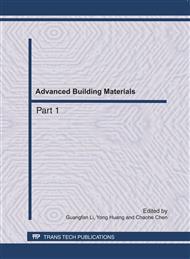p.804
p.809
p.817
p.822
p.828
p.834
p.839
p.843
p.849
Research on Contributing Factors of Gypsum-Based Composite Material Performance
Abstract:
The rules of various factors influence the gypsum-based composite material(GBCM) performance are studied, using orthogonal experiment from the material components, retarder dosages and different w/c ratio. The results show that the strength and softness coefficient of GBCM are obviously higher than that of pure gypsum. The Portland cement can markedly accelerate the coagulation of GBCM, when its mixed amount is 10%-15%, it can enhance the strength and softness coefficient of GBCM, but overdosage will cause fall of the strength and softness coefficient of GBCM. The phosphate retarder changes the growth habit of dehydrate gypsum crystal and the aperture distribution of GBCM, which correspondingly makes the crystal thickening and the pore structure deteriorating and ultimately leads to reduce the strength
Info:
Periodical:
Pages:
828-833
Citation:
Online since:
May 2011
Authors:
Price:
Сopyright:
© 2011 Trans Tech Publications Ltd. All Rights Reserved
Share:
Citation:


